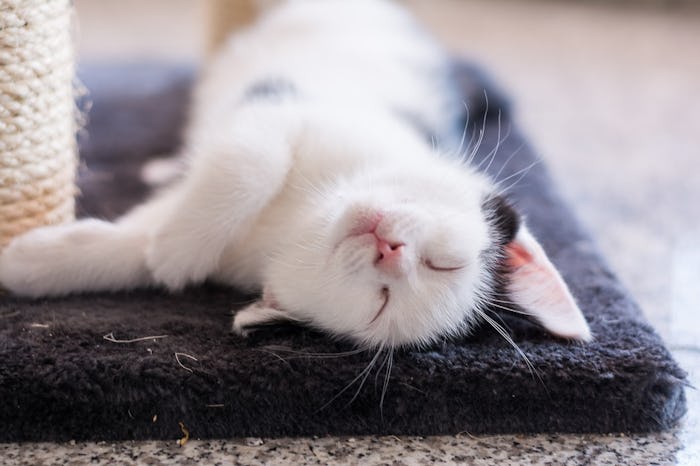Life post-baby comes with it's fair share of adjustments. But you and your partner aren't the only ones who have to get used to a new little one in the house. If you have a pet, they'll likely have a shock of their own when you come home from a few days away sporting a smaller stomach and a brand new addition to the family. Although most furry friends love their newborn "siblings," knowing the right timing to introduce the two future besties is important. If you're wondering when to introduce a cat to a baby, most experts say you don't need to wait as long as you might think.
According to the American Society for Prevention of Cruelty to Animals (ASPCA,) some cats don't tolerate change well, so if they've been used to being your baby for years, it may take a bit of time for them to adjust to a life of not being the center of your attention.
Of course, it's impossible to keep the two separated for long and introducing your baby to your feline friend the same day that you get home from the hospital is likely the most practical option. The same ASPCA article suggested that parents give their cat a bit of attention before allowing them to see the new baby. This will ensure that your kitty isn't threatened by the new arrival and that they know that they're not being replaced.
According to Baby Center, it's possible for newborns to display allergy symptoms when they're introduced to animals. Although your cat's fur isn't likely the culprit, the pollen, dust, and dirt trapped in their coat may cause your little one to get stuffy, watery eyes, or a rash. If you notice these symptoms, keep the two apart to see if the symptoms ease up. If they do, you'll have to determine whether or not baby's reaction is severe enough to warrant finding your kitty a new home. Otherwise, some allergies are relatively mild and don't warrant a big change.
Regardless of whether your cat has an attitude or is easy going, being cautious when introducing them to your baby is a smart decision.
